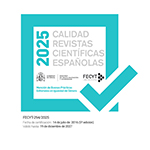A point of contact between German and Spanish philosophical traditions: the concept of “Lebensphilosophie” and “(Ratio)-Vitalism”
Abstract
The concept of “Lebensphilosophie” covers several philosophical trends that emerged in 19th century Germany (Dilthey, Schopenhauer, Nietzsche) and France (mainly Bergson) as a reaction to academicised philosophy, represented by an overly intellectualised and logically focused concept of reason that could not account for all the wealth and implications entailed in the term “life” for human beings. Afeature of this “philosophy of life” is its opposition to any kind of intellectualism and, therefore, the revaluation of intuition as opposed to tradition. It also promotes a more all-embracing view of human beings in the world, as relationships set up between its inhabitants are not determined exclusively by the use of reason but rather, equally, by ties of affection. In Spain, this “Lebensphilosophie” became known as “(Ratio)-Vitalism”, with Unamuno and Ortega y Gasset as its maximum exponents. However, in contrast to Germany, there was no break with the old way of philosophic thought, as Spanish philosophy has been characterised by this vitalism for centuries, often expressed not in philosophical but in literary terms (Cervantes, Gracián).Downloads
Article download
License
In order to support the global exchange of knowledge, the journal Revista de Filología Alemana is allowing unrestricted access to its content as from its publication in this electronic edition, and as such it is an open-access journal. The originals published in this journal are the property of the Complutense University of Madrid and any reproduction thereof in full or in part must cite the source. All content is distributed under a Creative Commons Attribution 4.0 use and distribution licence (CC BY 4.0). This circumstance must be expressly stated in these terms where necessary. You can view the summary and the complete legal text of the licence.










